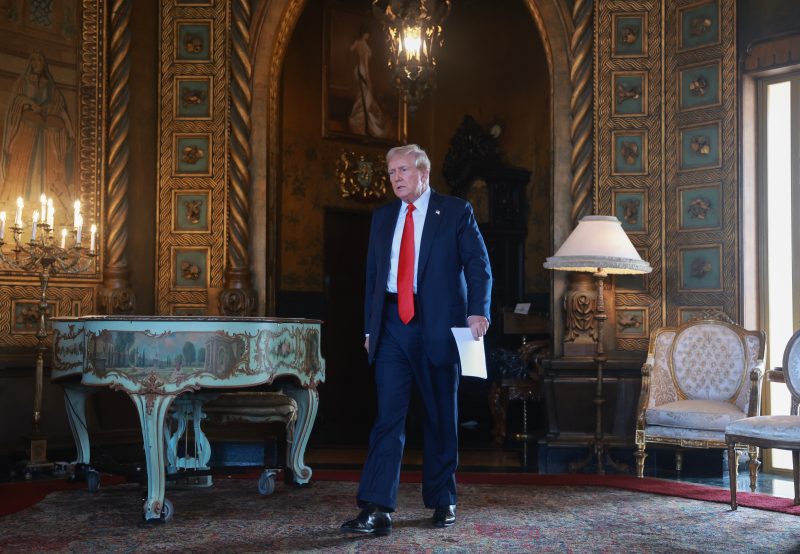The superficial, oversimplified reason Democrats decided to turn the page on President Joe Biden in the 2024 election was that he was too old. The more specific reason may have been that this problem — manifested in his stilted, often incoherent speaking and a light schedule — rendered him largely incapable of driving a consistent message about Donald Trump.
That fateful June 27 debate epitomized it. Biden didn’t even mention Project 2025, for instance, despite its quickly emerging as a leading Democratic talking point. And that was a big problem, especially with Trump suddenly more popular than he’d been in many years.
That very liability has now landed firmly in Republicans’ laps.
Amid some Republican consternation about Trump and his campaign’s slow build toward making a case against Vice President Kamala Harris, Trump emerged Thursday from his relative obscurity to deliver a news conference at Mar-a-Lago.
He spoke and took questions at length — for more than an hour.
One thing he did not do: Offer anything amounting to a coherent or detailed case against Harris and her running mate, Minnesota Gov. Tim Walz (D).
Trump has for years been prone to tangents and riffs and generalities, but even by his standards this session was unfocused. And that was despite the apparent reason for calling the news conference in the first place: to take on an opponent who was rising in the polls.
Trump said repeatedly that Harris and Walz were bad on issues, but often without saying how or even clearly describing the issue. He dwelled on process and polling, as well as Biden and Harris’s replacement of him, rather than Harris herself. And he for whatever reason didn’t even summon Walz’s name — referring to him as Harris’s pick, the “new governor from Minnesota” (Walz was first elected six years ago), the “Minnesota gentleman” and Harris’s “new friend.” (Sometimes politicians avoid naming their opponents while lodging attacks, but Trump was perfectly happy to cite Harris by name, repeatedly.)
Just as Biden failed to invoke Project 2025, Trump didn’t even mention many of the biggest potential sticking points for the Democratic ticket. There was nothing on Harris’s 2020 campaign support for banning offshore drilling and fracking, or her approving comments about the Green New Deal and “starting from scratch” with Immigration and Customs Enforcement (ICE). Ditto Walz allowing undocumented immigrants to apply for driver’s licenses or his stewardship of the Minneapolis unrest after George Floyd’s murder.
Last month I highlighted seven potential vulnerabilities for Harris from that 2020 campaign; Trump mentioned only two of them — both glancingly.
On Harris’s past support for a mandatory gun buyback program for assault weapons, Trump said twice simply that Harris wants to “take away” people’s guns. He also briefly mentioned Harris wanting to “defund the police.” (Harris’s past comments sympathized with the defund-the-police movement but didn’t explicitly advocate defunding the police.)
That the other things went unmentioned was particularly astonishing given that many of them feed into the same themes Trump sought to play up: inflation, energy prices, immigration and crime.
When Trump did bring up specific attacks, they often lacked any real clarity and were almost perfunctory.
He mentioned “what they’ve done to the national reserves.”
“The Strategic National Reserves is, as you know very well, because you cover it, but what they’ve done is incredible,” Trump said. “They’ve just — for the sake of getting some votes, for the sake of having gasoline, you know, that’s meant for wars. It’s meant for, like, tragedy.”
Left out? What the Biden administration actually did with the Strategic Petroleum Reserve, which was to deplete it.
Trump repeatedly accused Harris of having “destroyed” San Francisco and California as a prosecutor and state attorney general. About the closest he got to saying how was a brief reference to “no cash bail, weak on crime.” (In fact, Harris’s push to eliminate cash bail came after she left those state positions; she had previously pushed for higher bail amounts in some cases.)
Trump was asked, “How you are going to go after Black voters now that she is the nominee?”
He proceeded to summarize his poll numbers and express confidence, before landing on this recipe: “I think ultimately, they’ll like me better because I’m going to give them security, safety and jobs; I’m going to give them a good economy.”
Trump referenced Harris having attacked Biden in 2019, saying she was “nasty with the — calling him a racist, and the school bus and all of the different things.” The “school bus” reference appeared to be Harris attacking Biden’s past stance on busing Black students to different schools.
Trump was asked how Harris compares as an opponent to Biden and Hillary Clinton. He briefly spoke about how Clinton was smarter than Harris — rather than, for example, accusing Harris of being more liberal — and quickly asked for the next question.
And with Republicans hitting Walz for a “trans refuge” bill that protected access to gender-affirming care, Trump merely said the Minnesota governor was “heavy into the transgender world.” (He followed that by accusing the Democratic ticket of being “heavy into lots of different worlds, having to do with safety” — whatever that meant.)
Trump summarized:
“These guys get up — think of it: We’re going to give you no security, we’re going to give you a weak military, we’re going to give you no walls, no borders, no anything, we’re going to — all these things they’re doing,” Trump said. “I mean, the transgender became such a big thing. But they do all of these things.”
But “these things” were largely outcomes rather than actual policies. And to the extent Trump won’t or can’t offer details about why Democrats will drive things in those directions — or really demonstrate any familiarity with Harris’s and Walz’s actual records — Republicans might begin to worry about their own candidate’s campaigning wherewithal.

